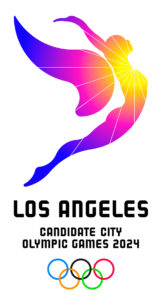Terrence Burns ©2017

For those of you wondering, the title of this post is “borrowed” from the 1997 movie, L.A. Confidential, starring Russell Crowe, Danny DeVito, and Kim Basinger. It’s the first time I’ve ever worked movie stars’ names into an Olympic blog post, but, it is LA, so… By the way, the movie’s plot and its title have nothing to do with the LA 2028 bid, this post or the Olympic Games. I just thought it was an apt title.
Note: I use both LA 2024 and LA 2028 in this article, but not interchangeably; I do so in an attempt to capture the nature of the bid at specific timeframes in the two-year long, unprecedented campaign.
This story is an Olympic story, which means, it is a children’s story; a story for children aged from 5 to 105. If we are lucky we all retain that special spark of childhood, the belief in what really matters in life – dreams, and hope. That is the essence of the Olympic brand. This is LA 2028’s version. Oh, and I should add, this is also a bit of a love story between this humble writer and a city and her people.
My own LA 2028 story began very late on a cold, snowy, February evening in Almaty, Kazakhstan, at the offices of the Almaty 2022 bid committee.
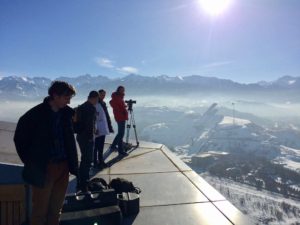
Boston was just selected by the USOC in January to compete with Paris, Rome, Hamburg, and Budapest for the 2024 Olympic and Paralympic Games.I got a call from the brand-new Boston 2024 CEO, John Fish.
John said, “we want you on the team – tell me what it will take, and I’ll send you a contract.” He talked very fast in a strong Boston accent, but the mobile reception was terrible; frankly, it was hard to understand him. But I got the gist.
I told John I appreciated the call but wasn’t quite ready to commit to any 2024 city and was in discussions with another city. Then I went back to the evening, which was in the middle of the IOC Evaluation Commission’s visit to Almaty – a tense week. But eventually, due to some issues surrounding our firm’s other business interests, we said “yes” to Boston 2024. So, after many years working around the world, Boston was to be my first American Olympic bid, and the opportunity to work in the United States for the first time since 1996.
We began work on 1 April 2015. Then things got weird. To make a short story even shorter, Boston 2024 didn’t work out so well. By June it was obvious the bid was dying, and by July, it was dead.
One of our firm’s principals called and asked me if I’d considered LA 2024. I said, “no, I haven’t really, and given what just transpired with Boston I don’t really think I want to….”
To make another short story even shorter, he and I had a call with the LA 2024 Bid Chairman, Casey Wasserman. I’d never met Casey but knew of him by reputation in our industry. I knew he had a growing and thriving business and was well connected in sports, entertainment and political circles. And, I knew he was young and on the move – up.
All of these things piqued my interest because frankly, he seemed exactly what a US bid needed in a leader.
I had about ten questions on the call. Casey answered them. He asked me some questions, I answered them. For a phone call between two strangers about something so important, it went pretty well. We agreed to a deal.
One week later I flew to LA to meet Casey in person. He was as advertised – charming, smart as a whip, and surprisingly funny as hell. I thought we hit it off quite well personally, which is always a plus with a new client.
In bidding, chemistry is incredibly important because there is nothing, and I mean nothing, more emotionally intense than the client/consultant relationship in an Olympic bid. For me, it is always a romance, and each time I do it leave a piece of my heart when it’s over. Yes, I’m aware of how dramatic that sounds, but ask anyone who has ever worked with me on a bid; I’m all in.
You cannot deliver a winning bid without total, 100% emotional commitment. You have to trust each other implicitly and have each other’s backs. It’s a high wire act and its uncomfortable for anyone not used to it – there are no do-overs or second chances. Get it right, you win. Get it almost right (or wrong, they’re the same thing in a bid) and you lose.
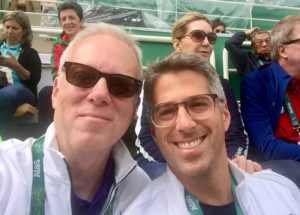
The day was a stunning Southern California day; the kind of day that you read about or see in a movie but aren’t quite sure it’s real: incredibly blue skies, low humidity, swaying palm trees and a temperature of about 78F/25C. Casey said, “It’s like this all the time.” I was smitten.
The truth is it probably had a lot to do with the view from his office on Wilshire Boulevard, overlooking Westwood and the campus of UCLA, with mountains in the background and the Pacific Ocean to the west. For two years I had a one-on-one weekly meeting in Casey’s office, and every time, I stopped for a moment and looked out that window and enjoyed the view. And whenever I mentioned the beauty of the place, Casey always shared my enthusiasm; he really loved his city.
I also met Casey’s Chief of Staff, Patricia Feau, who, over the two years became a dear friend, a confidant and key part of the bid. Her French husband, David, is the Head Chef at one of Beverly Hills most chic restaurants, Wally’s. It’s an amazing place to eat and a must if you ever visit.
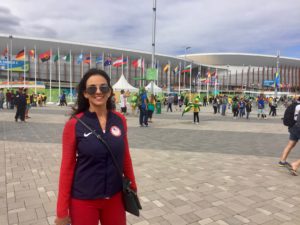
That day I also met with Danny Koblin and John Harper, two key Wasserman employees who were leaders in LA’s domestic USOC bid that lost (inexplicably) to Boston. The meeting was hastily thrown together in a Wasserman meeting room. I hadn’t prepared anything specifically, so we spoke about the recent Almaty 2022 presentation and watched it online as an example of the type of work we’d be doing for the bid. Danny went on to become the Chief Bid Officer of LA 2024, and John the COO. Our team would work extensively and very closely with these two for the next two years
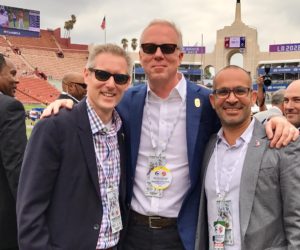
It’s often delicate parachuting into a team that already exists and has been working together on a project for a time, and even more delicate when you are billed as the “external expert.”
It’d been a long time since I worked with Americans and I admit, it took a while for us all to get used to each other. I thought we made a good team. And in the end, it’s results that matter, and together we achieved something wonderful for LA; for that, I am proud and thankful.
Another key player on the team from the domestic bid was Jeff Millman, LA 2024’s Chief Communications Officer. Jeff’s background was political campaigns, and he worked tirelessly to help ensure the local LA community remained engaged and supportive of the bid – no small feat in the new era of “No Olympics.”

Also, Jeff is also a fashion pioneer, spearheading the marriage of the New Balance classic 574 with dress pants and Lacoste polos. He graciously treated George Hirthler and me to a lovely evening of tacos at his house and, on my many long weekends alone in LA, would invariably send me a text inviting me for a bite or to hang out (much appreciated Jeff, thank you).
During this trip, I was also treated to a private meeting with LA’s mayor, Eric Garcetti at his office in the iconic LA City Hall. I recall describing him as an “Olympic bid mayor out of central casting.”
By the end of the campaign, I realized just how insufficient a description that was. Mayor Garcetti was simply amazing – in everything he did for us.
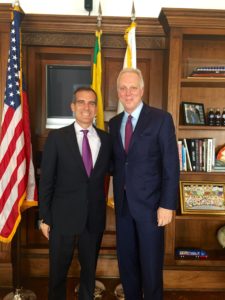
I’ve been around the Olympic Movement a long time. I’ve met with and worked with heads of state, politicians of every stripe, royalty, athletes, and celebrities. I’d never met a civil servant like Eric Garcetti. I used to say, “the brightest and best no longer go into public service in America.” Eric Garcetti proved me wrong; very wrong.
He was approachable, easy to work with, very generous with his time for everyone and a consummate professional at public speaking. He helped our speakers and me with guidance many times during the campaign. He and Casey cut a path of personality and charm (and ultimately friendship and trust) through the Olympic Movement like two hot knives through butter.

Allow me to stop here for a moment because I believe that this is important: The Olympic Movement and the USOC owe the city of LA and its team a tremendous amount of gratitude for what they did.
They not only picked up the utterly horrific mess left by the Boston 2024 debacle, but they also agreed to jump into a race where they were a year behind in planning, and clearly not a favorite by any stretch of the imagination. And they did it with grace and confidence, setting a new standard for an American bid committee.
That’s the LA I came to know and love. So, bravo and thank you Mayor Garcetti and Casey for saying “yes, not only are we still interested, but we also want to do what is best for the Olympic Movement.” And they meant it. It was bold. Bold wins, always.
I was on my annual off-road motorcycle trip, this time in Utah, and I missed the 1 September 2015 bid launch that featured Olympic legend Janet Evans as the MC. Of course, I knew who Janet was – I was at Opening Ceremony in Atlanta in 1996, when she passed the Olympic Flame to Muhammed Ali to light Atlanta’s caldron, opening those Games. And of course, I remembered Janet dominating her sport during her competition years. Janet Evans is Big Time. But I’d never met her or heard her speak professionally.
When I got home, I watched a video of the launch, and I was impressed by her confident style and easy grace. Casey and I had a chat, and I told him that every bid needed an “Athlete Commission” and that he should hire Janet to run it (selfishly, I could already see her as a principal speaker in future presentations – which she was).
Internally, Brock Park on our team and I worked on a job description, a mission statement and set of principles for the Athlete Commission. We shared it with Janet, and she agreed to come onboard. One of the best hires ever. Janet may be from the single athlete, lonely sport of long-distance swimming, but she’s one of the best team players I’ve ever worked with; and most importantly in the Olympic world, she isn’t a Diva, she’s a genuinely good person.
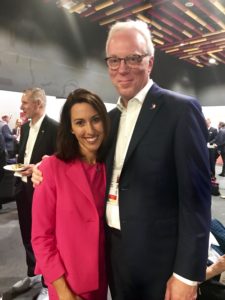
The Times, They Are a’ Changing
It was a very different race from the start. I’d just endured a Winter Games race where only two cities were left standing in the end, Beijing and Almaty, neither of which generated much real enthusiasm. The Movement was reeling from the blinding-speed cultural, societal and economic changes taking place around the world. Suddenly, it seemed as if no one wanted the Games.
I won’t go into the myriad of reasons why, but I will say that much of the world seemed ambivalent at best, and cynical at worst to hosting a Games. This is a problem many years in the making and an issue that everyone in the Olympic Family – myself included – played a role in creating.
This race was different because even though there were five great cities vying for 2024, Olympic insiders could already sense a few of the bid’s fragility. We were all holding our collective breath over the two words that have become the new challenge of the Olympic Movement’s efforts to find Candidate Cities: public referendum. In fact, Hamburg 2024 and its great team of my friends was the first 2024 Candidate City to fall victim on 20 November 2015.
But, I’m getting ahead of myself.
Right about this time, Gene Sykes, Goldman banker and “technology deal-whisperer” was named as CEO of the bid. Gene brought an abundance of experience, managerial skills and a wealth of unique relationships that would help serve the bid. How unique? Well, it was the first time I ever proofed a new hire press release with quotes from both Tim Cook of Apple and Bob Iger of the Walt Disney Company – that’s how unique. Gene became a trusted colleague, and I always found him to be thoughtful, earnest, contemplative and a quick study in a new and very different world – the Olympic world.
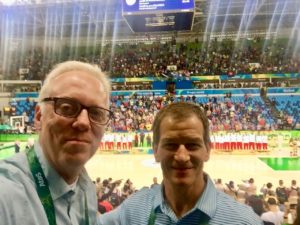
One of my team’s first assignments for every bid is to help create its vision, its story, its brand, and the answer to the question, “why LA?”. It begins with research. Our team consisted of me, Mark Smith, Brock Park and my longtime friend, mentor, former business partner and Olympic aficionado, George Hirthler.
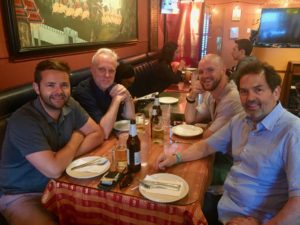
We conducted about 75 one-on-one interviews within the Olympic Family, asking about LA as a potential Host City. It’s mainly a SWOT (strengths, weaknesses, opportunities, and threats) analysis. We also conducted a comparative SWOT for the competing cities, then we mapped out the various findings in a matrix that began to compare and contrast the functional and emotional differences.
After two months, we had an initial call with Danny, and Matt Rohmer, the new Marketing Director for the bid to give them a preview of where we’d landed on the brand model and the tagline.
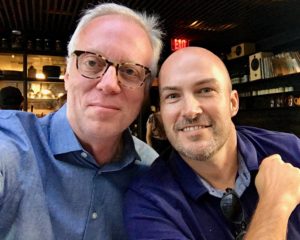
Basically, people around the world perceived LA (and California – the two were interlinked in foreigner’s minds, so we purposefully used them interchangeably at times) in finite terms. The most used words or phrases were: sunny, cool (meaning hip and trendy), creative, technology-savvy, Hollywood, innovative, traffic-clogged, smog-clogged, and full of shallow and superficial people.
So, we presented the good, the bad and the ugly, and then our recommended positioning, along with a tagline (or “slogan” in IOC speak) for the LA 2024 brand. This is difficult to do on a phone call, and the response was somewhat reserved on the brand work, and relative silence on the tagline; silence in a creative presentation is not a good thing, by the way.
We listened to their comments, worked on it a bit more and scheduled a meeting in LA to present to the entire team. Now, it wasn’t lost on me that I, a 57-year old man from the South was going to the most creative city on earth and tell everyone in the room – all younger than me – what their cool, new Olympic brand was all about. It was a bit intimidating. But I was confident that our work would resonate with the target audience – the Olympic Family – and I give Casey tremendous credit for allowing us to run with it.
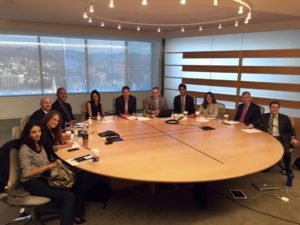
Below is a one-page overview of the LA 2024 brand’s positioning, values, attributes and initial messaging (thanks to Matt (!) for suggesting this one-page format to summarize a 40-page deck). Happily, this work served us and the bid well over the course of the next two years. It was the bedrock of our competitive positioning, and it echoed in every speech, press release and external communication of the bid. It clearly differentiated LA 2024 from the pack.
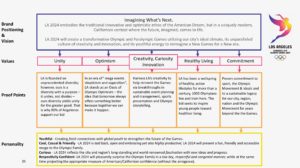
The Tagline
Taglines are always tricky and extraordinarily subjective. We’ve had some winners over the years (PyeongChang’ 2018’s “New Horizons”), some good ones that didn’t win (Almaty 2022’s “Keeping it Real”) and some forgettable ones such as Moscow 2012’s “Imagine it Now.” We had a beautiful one (and a beautiful brand) for Rome 2020, which never saw the light of day (they dropped out of the race at the last moment) called “A Time for History.”
So much of the research around LA 2024 was focused on the sun, sunshine, optimism, etc., that it was hard to ignore it. Even though some of the LA team felt it was kitsch and too predictable, it was the critical attribute that LA owned vis-à-vis the competitors and it was essential to the target audience. It was important not to take it literally, and this proved a hard thing at first for some of our team members.
Here is how we described the sun and its importance to the LA 2024 brand:
The Sun is a metaphor for progress, the future, for hope, for health, for optimism and ultimately for happiness.
The pioneers followed the Sun all across the North American Continent, finally to California – a state that has become synonymous with progress, innovation, imagination – and opportunity, the promise of tomorrow.
We knew that none of this sentiment resonated with our competitor cities of Paris, Hamburg, Rome, and Budapest. We believed that we could own it and make a great story and brand out of it.
In our quest to come up with an LA 2024 tagline, we scoured many sources for quotations or statements involving the word sun. Late one afternoon on the magical beach in Carmel, California, I stumbled upon this quote:
“Following the light of the sun, we left behind the Old World….”
The quote is by Christopher Columbus. Currently, not the most politically correct historical figure, yet his sentiment expressed precisely what I was trying to communicate – leaving the past behind to embrace the future. To get to the future, you have to get to tomorrow and to get to tomorrow you have to follow the sun. So, there it was. “Follow the Sun.”
I saw it both as an invitation and a challenge. Some of our LA team thought it was too passive. But, I could see the arc our brand message (and the campaign) would take over a two-year campaign, and I felt that “Follow the Sun” would eventually be seen for what it really was – a challenge to embrace the future. It worked. Our brand message was so on point that ultimately a few of our competitors started using some of our brand’s keywords and phrases – optimism, progress, and innovation – in their communications and speeches. We found that rewarding.
Interestingly, some Paris 2024 team members chose to portray our tagline literally. They launched a sardonic social media effort using hashtags such as #celebratethesun, and other statements such as “the sun belongs to everyone”. We didn’t engage them or respond with anything similar. We purposefully took the high road throughout the campaign, but we secretly celebrated every time someone on the Paris team used or referenced our tagline.
So, we had a brand model and a cool tagline. What’s next? A bid logo. And if you think selecting a tagline is a subjective circus, try coordinating collective agreement for a new logo.
LA 2024 hired one of LA’s hottest ad agencies, 72 and Sunny, to produce our films.
I remember giving the 72 team their first Olympic brand and LA 2024 Brand Model briefings at their very cool offices in Playa Vista (Howard Hughes’ old headquarters). Again, a bit intimidating with many of the youngest, most creative minds in LA in the room, but they were attentive and excited about the Olympics. They were very supportive of our brand model and direction for the LA 2024 brand. 72 would remain great partners and produce fantastic work throughout the campaign.
LA2024 then chose Bruce Mau Design to design our logo; we briefed them as well. After a few weeks with frustrating results, we asked one of 72 and Sunny’s founders, Robert Nakata, to take a swing at a logo because, before advertising, his first love was design.
After a relatively short amount of time, Robert came up with the LA 2024 Angel (for the City of Angels). As with all creative presentations, acceptance was not universal on our team. But with a few alterations, it evolved into a logo that everyone bought into, and over time, everyone came to love. What I loved about the logo is that it was a human form, an athlete, and a female; quite distinct from any previous bid logo I’ve ever seen. By the way, I loved the distinctive Paris 2024 logo, too.
During those first few months another crucial, all-encompassing process took place, the entire team worked feverishly on the first of three Candidature Files Submissions (bid books). These are very detailed, complex documents (in English and French) whose content is prescribed by the IOC to help them in their technical assessment of each bid.
Our bid book project was led by the competent Hilary Ash. In the “small world” department, Hilary’s father, Kevin, also worked on the Atlanta Games in 1996. Her first Olympic memory was at Atlanta’s Closing Ceremony as a five-year-old. Hilary remained a key player throughout the bid.
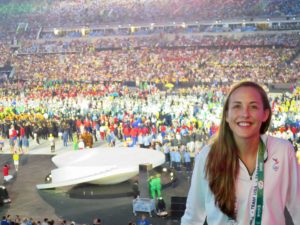
At a meeting in Lausanne in 2017, I joked that if LA did get the 2028 Games, by that time everyone would be working for her and another young lady named Cosette Chaput. Cosette was the lead consultant from LA’s exceptional partner agency handling social media, Laundry Service (more about Cosette and Laundry Service latter). Both of these young women were overachievers for the bid, and their contribution to LA’s victory was immense.
The first bid book was due on 17 February 2016, and it covered “Vision, Games Concept and Strategy.” The second volume was due on 2 October 2017, and it covered “Governance, Legal and Venue Funding.” The final volume was due on 3 February 2017 covering “Games Delivery, Experience and Venue Legacy.”
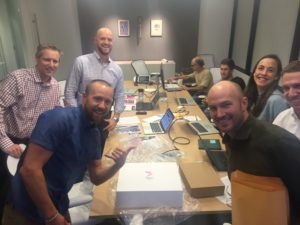
For each submission, we arranged for a member of our team to fly to Lausanne and hand deliver them to IOC headquarters to ensure they were there on time and intact. One of the most significant achievements of the IOC’s new bid process was that we did not have to print these books any longer.
In the old process, bid cities spent hundreds of thousands of dollars (I should know, I loaned Sochi 2014 the deposit money to get their bid books printed when the bid was short on cash) producing coffee-table quality books that hardly anyone read. The new electronic format made much more sense and saved a ton of money.
In February 2016, we had the unprecedented opportunity to test our brand and messaging on a very unique focus group of one: IOC president Thomas Bach. President Bach and his entourage came to visit LA on their way to Silicon Valley.
During his visit to our office, I was asked to share the LA 2024 Brand presentation with him. It was the first time I’d ever shown an IOC member an Olympic bid’s brand work, let alone the IOC president.
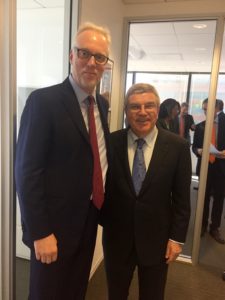
I’d know President Bach for many years, but it had been a very long time since I presented anything to him; almost two decades to be exact – back when I worked for the IOC’s external marketing agency, Meridian Management. So, in our very crowded conference room, we began. It took about thirty minutes. I finished with the tagline. Silence. Then he said, “I’m not sure if I am allowed to do this but…” And then he started clapping his hands. Then his team started clapping their hands, albeit a bit nervously, then we all joined in.
He congratulated the team on the work and then he said, “you used two words there that really stuck out to me…optimism and progress…we at the IOC don’t speak enough about these…” In my business, that counted as a good day, and one I will remember for a long time. I was glad that he appreciated it, but I was even more happy and proud that the LA 2024 team had begun to embrace it as their own brand – not mine or my team’s.
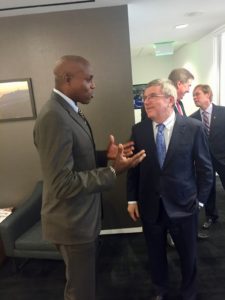
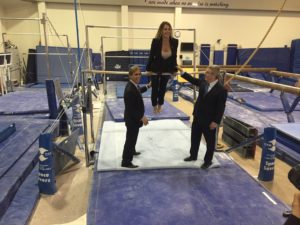
Stay tuned for LA Confidential, Part 2

